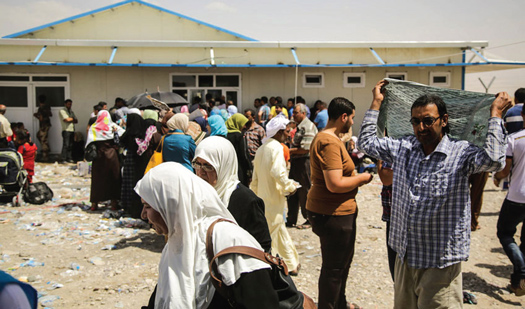
UNITED NATIONS (FinalCall.com) – Senior United Nations officials have expressed “deep concern” about the humanitarian situation of an estimated one million people displaced so far in 2014 in Iraq, particularly children, who are reportedly being recruited and used by militias on all sides.
“We have received worrisome information that children are taking part in hostilities,” said Leila Zerrougui, the special representative of UN Secretary-General Ban Ki-Moon for Children and Armed Conflict during a press briefing in New York.

“This recent wave of hostilities could inflict an even higher toll with children killed or injured, displaced, or separated from their families,” warned the Children and Armed Conflict office.
A deputy spokesman for the secretary-general informed The Final Call by e-mail that Mr. Ban would use his office as a “bully pulpit” to remind all sides in the Iraqi conflict of the impact their fighting has on civilians. Iraq’s total population as of 2013 is 34.7 million, according to the United Nations.
The spokesperson also listed UN humanitarian agencies helping to provide food, shelter and medicine, among other things to displaced Iraqis fleeing their homeland or are counted as internally displaced persons. These agencies include the UN Refugee Agency, the World Food Program, the World Health Organization and the Office for the Coordination of Humanitarian Affairs.
However Jacqueline Badcock, the United Nations resident and humanitarian coordinator in Iraq, told reporters that the ongoing conflict and the extremely volatile environment is likely to limit humanitarian access to displaced people in areas controlled by armed groups.
“Many are staying in the open and urgently need water, food, shelter and latrines,” the coordinator said in a statement to the press, adding, “There are concerns for their protection and reports of an increase in gender-based violence among the displaced.”
The UN Refugee Agency estimates that 25,000 people remain in Mosul, while 200,000 have fled to Dohuk and 100,000 people have crossed into Erbil under the Kurdish Regional Government since fighting began weeks ago in the region.
“The humanitarian needs of Iraq’s wider displaced population continue to mount,” added a UNHCR spokesman.
Ertharin Cousin, executive director of the UN World Food Program, released a statement June 25 to the UN press corps after her two-day visit to the war-torn nation. The UNWFP director met with displaced people at a transit camp who were staying in tents and makeshift shelters. “Only the strong and lucky, who could walk for hours in the scorching heat or those who have the means to travel by car, arrived at the transit camp,” she said.
The UNWFP director added that many people were worried that they would not be able to fast during the Islamic holy month of Ramadan due to little access to water, electricity and other necessities.
The World Food Program said $88 million is needed for its operation in Iraq through the duration of 2014.
In the meantime, the UN Food and Agriculture Organization is warning insecurity in Iraq could cause widespread hunger and wants $12.7 million to provide support to farming families.
On June 24, the human rights team assigned to the UN Assistance Mission in Iraq told reporters by a live video-feed that 1,000 people were killed in Iraq and another 1,000 were injured in two weeks of Islamic State of Iraq and the Levant violence across the nation.
A spokesperson for the Office of the High Commissioner of Human Rights in Geneva, Switzerland explained to the press that abductions continue to be reported in northern provinces and in the capital city Baghdad, some of which have resulted in killings. There is also evidence of summary executions continuing to take place, according to the Office of the High Commissioner of Human Rights.
In a strongly worded essay, Ajamu Baraka wrote the “policies operationalized over the last six years are responsible for the increased violence and destabilization in the region.”
The human rights activist and geo-political analyst said, thousands of Iraqis are fleeing because of the “policies of the moribund Western elite who still believe that the world is their personal chess board and people and nations are disposable pawns to be used and discarded at will.”












